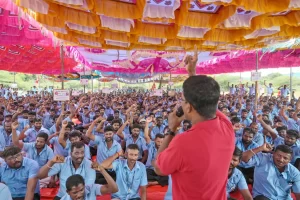End of Strike at Samsung India Factory After Month-Long Protest
3 min read
Around 1,500 workers from the factory had participated in the strike

Around 1,500 workers from the factory had participated in the strike
Workers at Samsung Electronics’ factory in Tamil Nadu, India, have ended a labor strike that lasted over a month. Approximately 1,500 employees in Chennai participated in the strike, which aimed to secure better wages, improved working conditions, and recognition for a newly formed union.
A labor activist who supported the workers informed the BBC that while Samsung has yet to officially recognize the union, it has agreed to address other key demands made by the employees. This strike stands as one of the largest labor actions against the South Korean technology giant in recent years and has raised concerns about its implications for India’s aspirations to become a global manufacturing hub, particularly as an alternative to China.
On Wednesday, the Centre of Indian Trade Unions (CITU), which played a pivotal role in organizing the protests, announced that the workers would resume their duties following a meeting. E. Muthukumar, a representative from CITU, stated, “During the meeting, it was decided that the workers would return to their jobs on Thursday.” He noted that the matter regarding the registration of the new union, known as the Samsung India Labour Welfare Union (SILWU), will be settled through court proceedings.
The decision to call off the strike was influenced by Samsung’s willingness to engage with the workers on essential issues such as higher wages, medical insurance, and improved facilities. Muthukumar mentioned, “We have decided to call off the protest as the Samsung management has decided to engage with workers on all key demands. Those discussions will continue.”
On Tuesday, representatives of the striking workers held discussions with officials from the Tamil Nadu labor department. Following this meeting, the state’s Minister for Industries, TRB Rajaa, announced that the workers had agreed to return to work immediately. He also indicated that Samsung had assured that there would be no retaliation against workers for participating in the strike.
Samsung later released a statement welcoming CITU’s decision to end the strike. The company affirmed, “We will not take action against workers who merely participated in the illegal strike. We are committed to working closely with our workers to make the Chennai factory a great place to work.”

The protest began on September 9 near the Chennai factory, which employs nearly 2,000 workers and is one of two Samsung plants in India. This facility is crucial for the company, producing home appliances that contribute approximately one-third of Samsung’s annual revenue of $12 billion (£9 billion) in India.
A central demand from the workers was for Samsung to recognize their union, as they believed that such recognition would empower them to negotiate better wages and working hours effectively. Akriti Bhatia, a labor rights activist, highlighted a troubling trend among multinational corporations operating in India, noting that many do not adhere to local labor laws that uphold workers’ rights to association and collective bargaining.
Bhatia explained that these companies often establish internal unions that appear legitimate on paper, yet are effectively controlled by management, thus undermining genuine worker representation. They tend to oppose external unions that have political backing, fearing that these unions would provide a more robust platform for workers’ rights.
A source within Samsung previously indicated that the company “fully supports unions but not those backed by a third-party.” This reflects the broader tensions between labor rights and corporate governance in India.
Earlier this year, similar issues arose when hundreds of workers at an Apple supplier’s manufacturing plant in Tamil Nadu staged a one-day strike, demanding union recognition. These incidents highlight the ongoing struggle for labor rights within India’s rapidly evolving manufacturing sector.
The resolution of the Samsung strike underscores the importance of worker solidarity and the need for fair labor practices as India seeks to position itself as a key player in global manufacturing. As discussions between management and workers continue, the outcome could set a precedent for how multinational corporations engage with labor movements in the region.